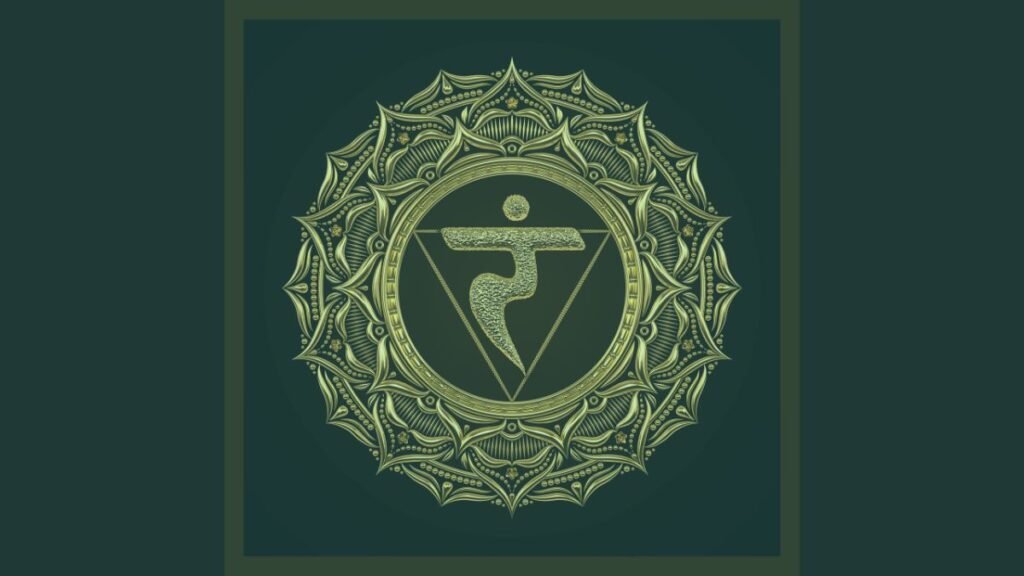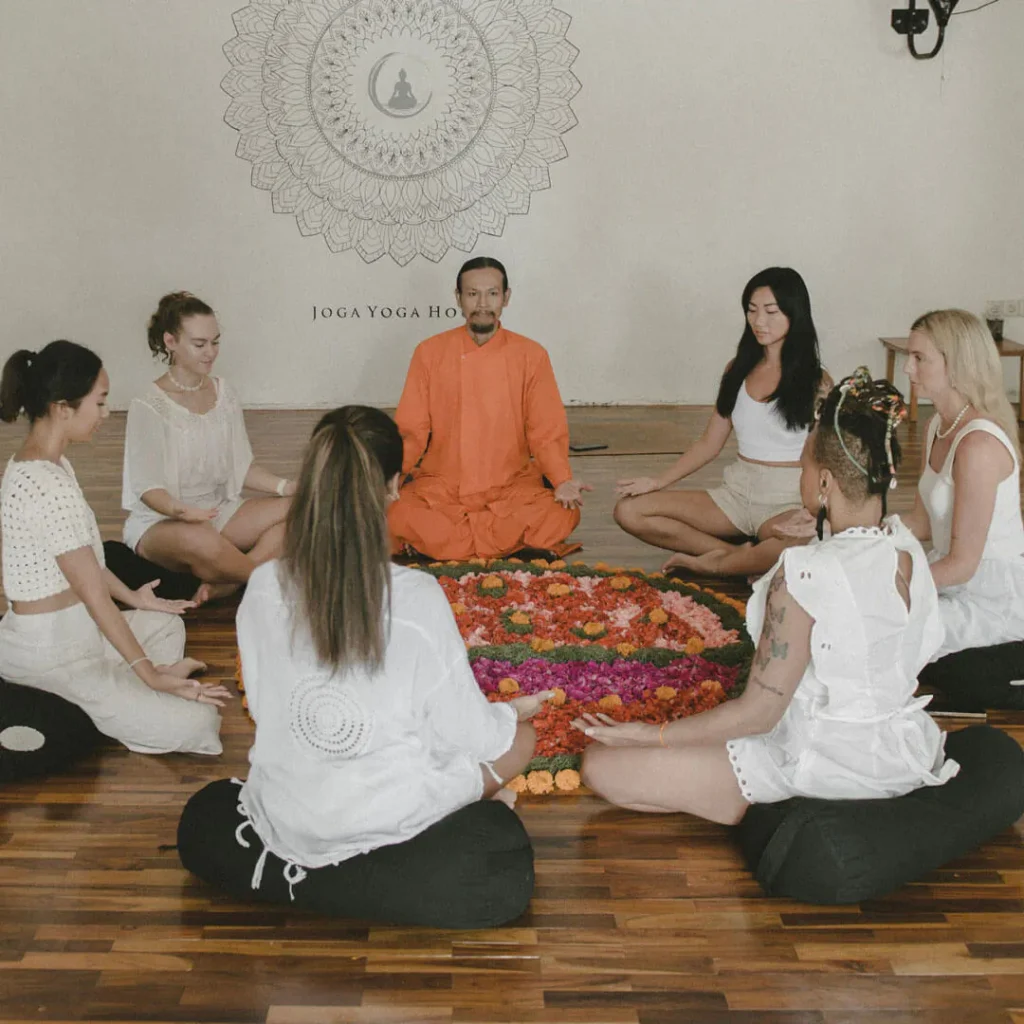What is Tri Hita Karana?
“Tri” means three, and in the Balinese concept of Tri Hita Karana, it points to three powerful sources of happiness: harmony with the divine, with other people, and with nature.
This idea comes from Sanskrit, the ancient language of spiritual wisdom. Let’s break down the full phrase:
Tri – Means “Three”
This part is easy. “Tri” simply means the number three. In this idea, it stands for three important parts of life that should stay in balance.
Hita – Means “Goodness” or “Happiness”
The word “Hita” is about what brings joy, kindness, or benefit. It’s the feeling of being well—in your heart, in your life, and in your community.
Karana – Means “Cause” or “Way”
“Karana” is the action or cause behind something. It’s what makes something happen. In this case, it’s what creates happiness and balance.
Putting It Together
So, Tri Hita Karana means “Three Causes of Goodness” or “Three Ways to Be Happy.” But it’s more than just a nice phrase. It’s a way of living — a guide for how people in Bali try to stay in harmony with everything around them. It connects their daily life, their community, and their spiritual world.
It’s not just a cultural idea. It’s a living framework — something people practice every day, from offering prayers to helping neighbors to taking care of nature.
The Three Pillars of Tri Hita Karana Philosophy
Tri Hita Karana is built on three big ideas. These are the pillars that hold everything up. If one of them is missing, things start to feel out of balance.
1. Parhyangan – Harmony with the Divine
This part is about staying connected to something greater than yourself — to God, spirit, or the sacred. In Bali, people show this through daily offerings, temple visits, and ceremonies. Every village has temples, and people often start the day with a small prayer. It’s a way of saying thank you, asking for guidance, and remembering that life is about more than just what we see.
2. Pawongan – Harmony Among People
Pawongan is about living peacefully with others. It means respecting your family, neighbors, and community. In Bali, this shows up in group work (called gotong royong), in village meetings (banjar), and in the way people share celebrations or help each other. It teaches that life isn’t just about “me” — it’s about “we.”
3. Palemahan – Harmony with Nature
Palemahan is the deep respect for the Earth. It means treating land, water, trees, and animals with care. Balinese culture sees nature as sacred. One big example is the Subak system, a smart and spiritual way of sharing water to grow rice. It’s not just farming — it’s a way of honoring nature while feeding the community.
Why These Three Matter
These three ideas — spiritual connection, social kindness, and care for nature — work together. When all three are strong, people feel balanced and life flows better. That’s what makes Tri Hita Karana not just a belief, but a way of living in harmony.
A Timeless Response to Modern Disconnection
Today, many people feel tired, overwhelmed, and disconnected — even when they’re busy all the time. We live in big cities, stare at screens all day, and scroll through endless news. But even with all this technology, something important is missing.
That’s where Tri Hita Karana comes in. It gives us a different way to think about happiness — one that doesn’t come from more stuff, more clicks, or more likes.
The Problem with “Me First” Culture
In many modern places, people are told to focus on themselves — to be independent, chase success, and keep moving fast. But this often leads to stress, loneliness, and burnout. We forget how to slow down, connect with others, or care for the world around us.
The Balinese Answer: Harmony, Not Hustle
Tri Hita Karana says true happiness comes from being in balance:
- With something greater than you (Parhyangan)
- With the people around you (Pawongan)
- And with nature (Palemahan)
It’s not about doing more. It’s about being connected.
While Western lifestyles often separate the spiritual, social, and environmental parts of life, Tri Hita Karana brings them together. That’s what makes it so powerful, especially now.
A Framework for Digital Balance
This isn’t just about old traditions. It’s also about modern mental health. Being more connected to nature, people, and purpose helps lower stress, improve sleep, and bring more calm into your day. In a world full of noise, Tri Hita Karana is like a quiet voice saying, “Come back to what matters.”
Practical Ways to Live Tri Hita Karana Every Day
You don’t have to live in Bali to practice Tri Hita Karana. Anyone, anywhere, can start using these ideas in small ways. Here are easy habits that bring this wisdom into your daily life:
Parhyangan – Harmony with the Divine
- Start with Gratitude: Begin your morning with a quiet “thank you” to life, to nature, or to whatever you believe in.
- Create a Mini Sacred Space: Light a candle or place a flower where you work or rest. Use it as a reminder to pause and breathe.
- Digital Pause: Take one moment a day with no phone, no noise — just silence.
Pawongan – Harmony with People
- Send a Kind Message: Text a friend just to say something nice or thank them.
- Offer to Help: Help a neighbor, listen to someone, or join a local group.
- Smile and Greet: Even small kindnesses — a smile or hello — build community.
Palemahan – Harmony with Nature
- Trash-Free Meal: Try eating one meal a day with no plastic or packaging.
- Plant Care: Water a plant, or grow herbs on your windowsill.
- Walk with Awareness: Take a 10-minute walk and notice trees, birds, and clouds. That’s mindfulness in nature.
A Simple Reminder
You can even turn Tri Hita Karana into a daily check-in:
- Did I connect spiritually today?
- Did I help or listen to someone?
- Did I care for the earth, even in a small way?
When you practice even one of these things each day, you start to feel more grounded, more present, and more alive. That’s harmony — in real life.
The Psychology of Harmony: Why It Works
Tri Hita Karana isn’t just a cultural tradition — it’s also backed by science. Each of its three pillars supports mental health in a different way. Let’s explore how.
Pawongan: The Power of Social Bonding
Being around kind, supportive people makes us feel safe and less stressed. This is something scientists call social regulation of emotion — and it’s a big part of what keeps us mentally healthy.
When Balinese people gather in their banjar (local council), or help each other through gotong royong (community work), they’re building what psychologists call community resilience. Just knowing you’re not alone can lower anxiety, improve your mood, and even help your body heal faster.
Parhyangan: Awe and Meaning
When people connect with something bigger than themselves — through prayer, meditation, or just quiet reflection — they often feel more grounded and calm. Psychologists call this awe or spiritual salience.
Balinese rituals and temple ceremonies create a deep sense of meaning. Research shows that when we feel a sense of purpose or sacredness, our brains release chemicals like serotonin and oxytocin, which make us feel good and help manage stress.
Palemahan: Nature Heals
Have you ever felt better after a walk in the park or time near trees? That’s nature therapy in action — and it’s a growing area of study called ecopsychology.
In Bali, the Subak system of rice farming isn’t just about food — it’s a way to stay connected to nature. People work with the land, honor it through ritual, and keep it healthy for the next generation.
Science shows that even 20 minutes in nature can lower cortisol (the stress hormone), reduce blood pressure, and boost focus. When people care for the Earth, they’re also caring for their own nervous system.
One Framework, Many Benefits
Tri Hita Karana brings together all three: social connection, spiritual meaning, and nature contact. It’s not just good philosophy — it’s good psychology too.
Tri Hita Karana in the Age of Climate Crisis
We’re living in a time of big environmental change — melting ice, rising seas, and polluted cities. But while many people feel helpless, Tri Hita Karana offers a hopeful path forward.
Living in Balance, Not Extraction
Modern life often takes from the Earth without giving back. But the Palemahan principle says: we are part of nature, not above it. This shift — from domination to connection — is the heart of regenerative living.
In Bali, this shows up in community gardens, plastic-free markets, and rituals that bless the land and water before planting. It’s not about rules — it’s about relationship.
Permaculture and the Subak System
One great example is the Subak irrigation system — a way of sharing water for rice farming that has spiritual roots. It’s not just efficient — it honors the water as a gift from the gods. That’s circular economy thinking in action: nothing is wasted, everything is respected.
Today, new farmers in Bali are learning permaculture farming methods that copy how nature works. They plant food forests, build compost systems, and teach kids how to grow without chemicals.
Eco-Tourism with Purpose
Places like wellness retreats and eco-villages are starting to use Tri Hita Karana as a guide. Some examples:
- Beach cleanups as part of ceremonies
- Reusable containers at hotels
- Programs that mix yoga, farming, and prayer
This is called sustainable tourism, where visitors give back to the land and culture they enjoy.
A Local Idea with Global Impact
If more communities followed Tri Hita Karana, we’d see real change, not just in Bali, but everywhere. It teaches that healing the Earth starts with how we live, how we treat each other, and how we see the world.
Global Lessons from Local Wisdom
Tri Hita Karana is a Balinese idea, but its message speaks to everyone. In a world filled with disconnection, stress, and environmental problems, this simple framework offers a new way forward.
What Can Schools Learn?
Schools can use Tri Hita Karana to teach students about respect, not just for others, but for nature and spirit too. Instead of only focusing on grades, imagine classrooms where:
- Morning check-ins begin with gratitude (Parhyangan)
- Group projects build teamwork (Pawongan)
- Nature time or gardening is part of the week (Palemahan)
This creates not just smarter kids, but kinder, calmer, more grounded ones.
What Can Companies Learn?
Businesses often focus only on profit. But they could grow stronger by thinking about balance:
- Harmony with spirit = values-based leadership, purpose-driven culture
- Harmony with people = healthy teams, fair pay, mental wellness
- Harmony with nature = zero-waste policies, green design, giving back to the Earth
This is what some call the triple bottom line — people, planet, and purpose — which is already used in ethical business models around the world.
How to Apply This in Any Culture
You don’t have to be Balinese to live by Tri Hita Karana. Its core values are universal:
- Every culture has a way to connect with spirit — prayer, silence, or awe in nature.
- Every community can grow through cooperation, kindness, and shared effort.
- Every home can be a little greener through habits, design, or education.
What matters most is the balance. When these three areas work together, life becomes more whole.
Explore Tri Hita Karana with Joga Yoga Teacher Training
If you want to go deeper into the heart of yoga—not just poses, but purpose—Joga Yoga’s Teacher Training is the perfect next step. Rooted in authentic traditions and modern science, the program brings the spirit of Tri Hita Karana into every aspect of learning.
Why Train with Joga Yoga?
- Parhyangan (Spirituality): Learn the deeper teachings of yoga philosophy, mantras, and mindful rituals.
- Pawongan (People): Be part of a nurturing community where connection, discussion, and shared growth are core.
- Palemahan (Nature): Practice in eco-conscious spaces, with teachings that honor the Earth through sustainable, grounded living.
Whether you want to teach or simply deepen your own path, this training is designed for anyone ready to live yoga from the inside out.
👉 Visit Joga Yoga Teacher Training to learn more or apply today.

Frequently Asked Questions
What does Tri Hita Karana mean?
Tri Hita Karana means “Three Causes of Goodness” or “Three Ways to Be Happy.” It’s a Balinese way of living that focuses on staying in balance with spirit, people, and nature.
Who created the concept of Tri Hita Karana?
Tri Hita Karana comes from ancient Balinese wisdom rooted in Hindu beliefs. It’s not from one single person, but it has been passed down through traditions, stories, and rituals for generations.
How do Balinese people practice Tri Hita Karana today?
They practice it through daily offerings, helping neighbors, village teamwork (banjar), and caring for the land through systems like Subak irrigation. It shows up in ceremonies, farming, and even tourism practices.
How can I use Tri Hita Karana in my daily life?
You can use it by:
- Taking time for gratitude or prayer (Parhyangan)
- Helping someone or connecting kindly (Pawongan)
- Caring for nature, even in small ways (Palemahan)
Start with one small habit from each area — and build from there.






